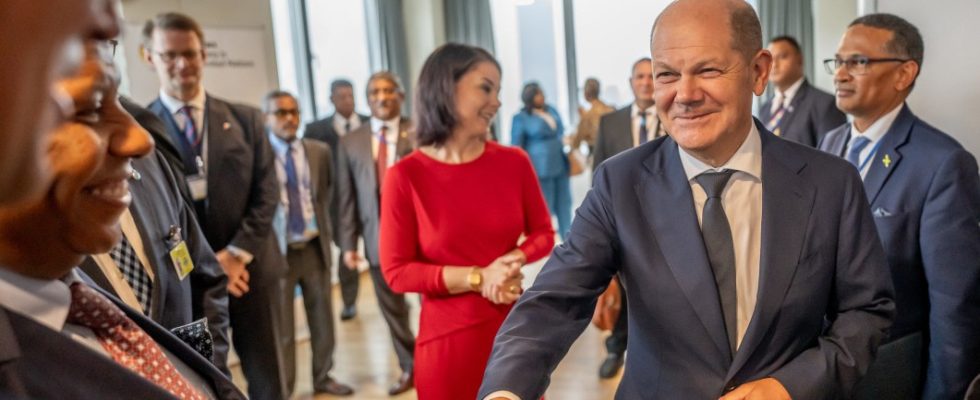The dining room on the fourth floor of the UN building in Manhattan is a place of rather austere charm, which is why the Secretary of State’s job is not to be envied. Annalena Baerbock has the first word, she has to get the celebration started now. “This isn’t a reception, this is a birthday party,” she announced happily on Monday evening. The 50th anniversary of Germany’s UN membership is being celebrated on the eve of the General Assembly, along with Baerbock, Federal Chancellor Olaf Scholz, Development Minister Svenja Schulze and Environment Minister Steffi Lemke. High-ranking government representatives from all parts of the world are entertained with appetizers, sausages and sauerkraut. In the dining room, presidents, heads of government and ministers parade past Olaf Scholz and his wife Britta Ernst. North Macedonian Prime Minister Dimitar Kovačevski greets Scholz with a “high five”.
This Tuesday, Scholz will speak to the General Assembly for the second time. In his celebratory speech the evening before, the Chancellor asked the guests to think back to 1973. “The world was divided. Two systems, two blocs, two German states. And a wall that ran through the middle of Berlin, about 400 meters from where I am today Office removed,” says Scholz, describing the year in which the two German states were accepted into the United Nations. It was only almost 30 years after the Second World War started by Germany that the Federal Republic and the GDR, previously classified as “enemy states” by the UN, were allowed to take their place in the global community. At that time, the end of the Cold War and German unity seemed like a “utopia far away,” recalls Scholz. The guests sense that Scholz also recommends a utopia for the present.
The end of the Cold War came “because courageous people in East Germany and all over Eastern Europe tore down the Iron Curtain,” says the Chancellor. Leaders and citizens around the world had the courage to “believe that even the deepest divides can be overcome.” At this point, Scholz, who rarely praises political role models, talks about the first Social Democratic Chancellor and Nobel Peace Prize winner Willy Brandt. “He understood what an opportunity joining the UN meant for both German states. An opportunity to reduce tensions,” he says.
One of the conditions for this was to “reject any form of revisionism, especially with regard to the borders drawn after the Second World War,” emphasizes Scholz. The principles of that time have become part of Germany’s “political DNA”. From this follows: “A no to violence as a means of politics. A no to revisionism. And a clear yes to attempts to overcome rifts.” Russia does not mention Scholz by name, but speaks unequivocally that imperialism is “once again showing its ugly face.”
Germany not only celebrates itself in New York, it also recommends itself as a champion of international law. The 50th anniversary is a reminder that the United Nations was also founded “in response to the terrible atrocities of Nazi Germany, the Holocaust and the Second World War,” says Foreign Minister Baerbock. Even 50 years later, this results in “a special responsibility”, for example to advocate for a rules-based international order.
Following the motto “Do good and talk about it”, Chancellor Scholz and the ministers are also pointing out the considerable German financial contributions at every opportunity these days. “Germany stands by its commitments. We are the second largest donor of public development aid in the world,” emphasized Scholz at the sustainability summit that preceded the General Assembly. During its chairmanship of the G7, the large western industrialized nations, Germany launched an alliance for global food security. Germany spent a total of five billion euros “to combat the most dramatic consequence of Russia’s war against Ukraine for the world: hunger.”
Like its predecessors, the Federal Government is confidently deriving a claim to leadership in the UN system from its commitment. Over the past few decades, Germany has been elected to the UN Security Council every eight years – and Scholz and Baerbock want it to stay that way.
“Advocating for the rules of the international order, advocating for peace in this world” also guides the German candidacy for the non-permanent seat on the Security Council for the years 2027 and 2028, says Baerbock. The Foreign Minister demands that the UN needs to be modernized. The United Nations reflected “the world of the last century and not the world of this century.” Asia, Africa and Latin America are not given due consideration in the Security Council and other UN bodies.
At least at first glance, the demand that Germany be included in the Security Council as another permanent member from Europe alongside Great Britain and France does not fit with this. The federal government has not given up on this long-held wish. But people no longer talk about it particularly loudly. At the 50th anniversary celebration, Scholz prefers to follow in the tradition of his predecessor Brandt. “Even deep divides can be overcome,” he says, “if we work together with courage, with creativity and with an unshakable commitment to the principles of this United Nations of ours.”

